How do you know if you have a secret indictment?
There is no way to know if you have a secret indictment with any amount of certainty. Individuals who believe they have a secret indictment should contact an attorney immediately.
 Written by Background Check Repair
Written by Background Check Repair
Criminal Records | June 27, 2024
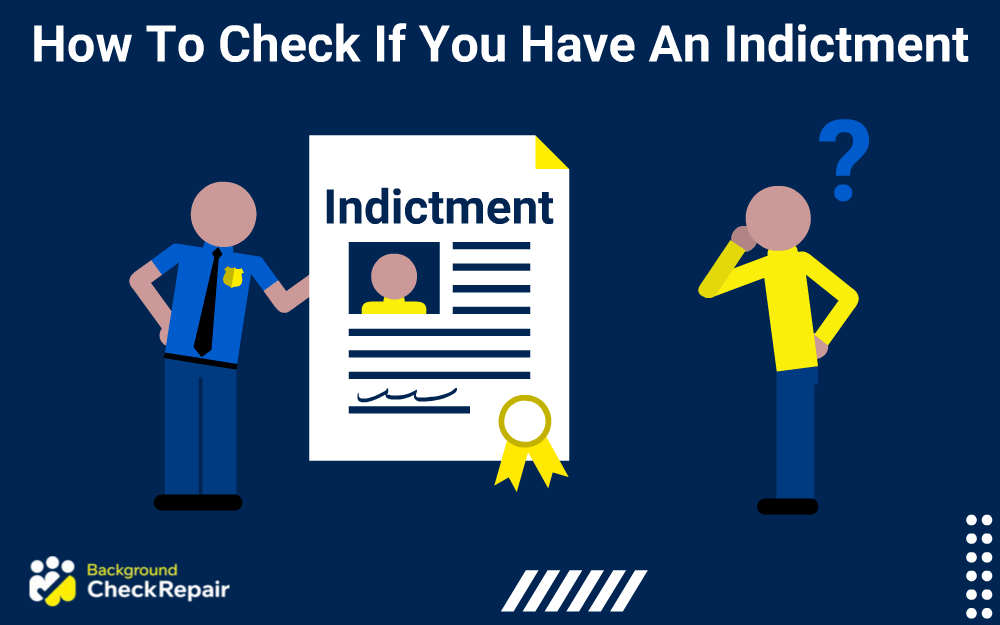
Table of Contents
Knowing how to check if you have an indictment is a very important skill that allows individuals to quickly get the legal help they may need. This is especially true when looking for indictments by searching official records and court resources.
Being indicted for a criminal offense is scary no matter the circumstances. But it can be even more bewildering if the indictment is filed without the person’s knowledge, even in cases that aren’t protected under a sealed or secret indictment process.
Understanding the legal process for indictments and how to check if you have an indictment can make a huge difference, because it makes the defense preparation much easier.
This guide explains exactly how to find out if charges have been filed against you, and how to perform an official indictment search.
Before figuring out how to check if you have an indictment, individuals should learn what exactly is an indictment and what is the difference between an indictment and being charged with a crime?
Essentially, an indictment is a formal accusation that an individual committed a crime. Although a charge is also a formal accusation that an individual committed a crime, the difference lies in who files the accusation.
Often when a crime is committed there will be irrefutable evidence gathered by police at the scene, and often police take that person into custody. Since the police report indicates that a law enforcement officer witnessed the crime, little else needs to be done to make the formal accusation of charges using the police arrest record.
Indictments are a little bit trickier and thus less common. Rather than a prosecutor filing criminal charges against an individual suspect, a grand jury decides if there is sufficient evidence to lead to the conclusion that a crime likely took place.
Essentially, a grand jury (different from the jury deciding the outcome of a trial) decides to charge the individual with a crime, rather than the prosecutor.
There is more than one way to know how to check if you have an indictment, especially depending on the level of the charge.
For example, some crimes are charged at the local level, while others are handled by federal jurisdiction (in that case it’s important to know how to search if someone has a felony indictment).
Individuals will need to check court records at various levels to find indictments.
Indictments, like pending charges, criminal convictions, and arrests without conviction, are considered public information. This means that Freedom of Information Act laws allow anyone to view indictment information at any time, with a few exceptions.
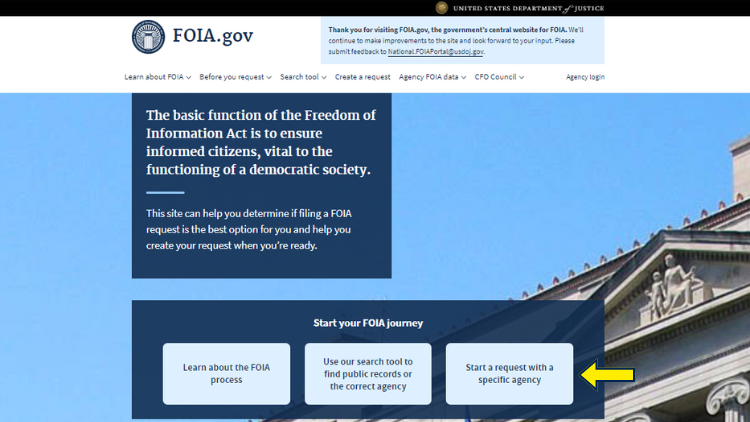
(Image: Freedom of Information Act1)
It is worth noting that in some cases checking for indictments can reveal certain information, such as your location. It is always a good idea to consult a lawyer if you have reason to believe that you may have been indicted. A criminal attorney will be able to find out more information at no risk to the individual.
How to Search Indictments in County Court Records
The first place to check for indictments is through county court case records. Just be sure to search in the county where the crime in question took place, because only that county’s courthouse will have the indictment information.
The process for checking county court records ranges widely from county to county, but the following steps can be applied universally. To conduct the search:
Step 1. Google the name of the county where the indictment may be filed with the words “County Court Clerk.”
Step 2. Sort search results to identify the official county clerk of courts. (usually a .gov URL address).
Step 3. Visit the court site and search for tools like “case lookup,” or “public records.”
Many counties have these tools prominently situated on their websites for easy access, and the results will display information about making public records request, which include how to check if you have an indictment.
For counties that do not have a searchable online database for public records, individuals will likely need to contact the county court clerk directly. The court contact information should also be available on the website.
How to Search Federal Court Records for Indictments
In many jurisdictions, it is far more common to indict individuals that are believed to have committed a federal crime. Several states even require that federal crime be indicted, rather than having the charges brought by a prosecutor.
Resources such as the Public Access to Electronic Court Records system (PACER) allow individuals to search for charges and indictments that have been filed all over the county, rather than having to search through courthouse by the courthouse to find the same information.
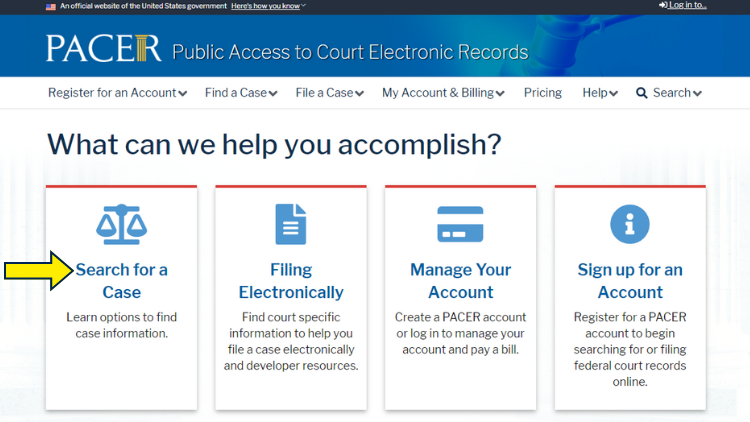
(Image: Public Access to Court Electronic Records2)
Simply log into the PACER system by creating an account, and search for cases that contain the names of potential people involved in the indictment. The steps are outlined below:
The first step is to access the PACER website. The website has tons of useful information regarding federal courts. On the website’s homepage, simply select “search for case” to proceed to the next step.
In order to search for cases on PACER, individuals must create an account. The registration process will require some personal information as well as a payment option to pay the fee associated with each search.
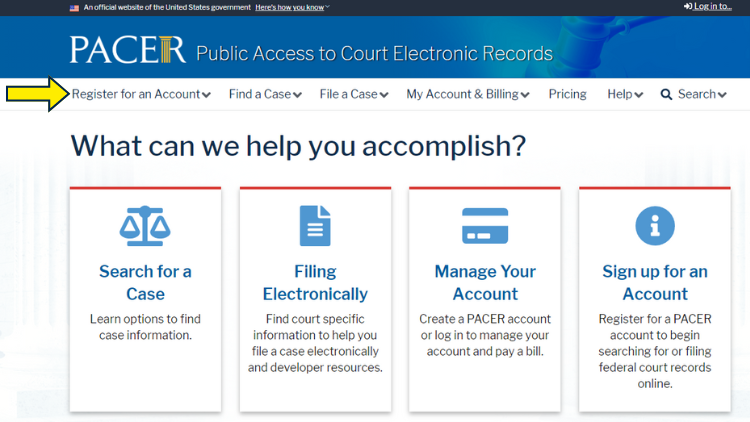
(Image: Public Access to Court Electronic Records2)
In some cases, it may be a good idea to have a friend or family member create the account and perform the search as it may give away valuable information. In any case, consulting with an attorney before performing a search is always advised.
Once the account has been created, select the “Search by National Index” option. This will allow users to search for court documents from every federal court in the country.
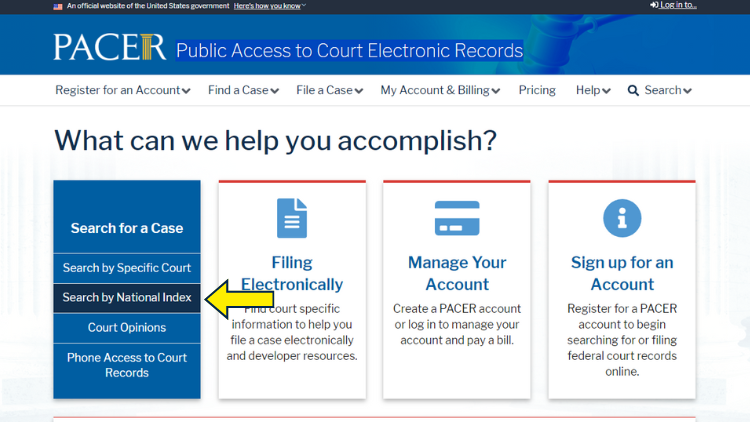
(Image: Public Access to Court Electronic Records2)
Perform the search using the name of the individual for the best results. Results should be available immediately. This is a great way to find out if charges are filed against you online.
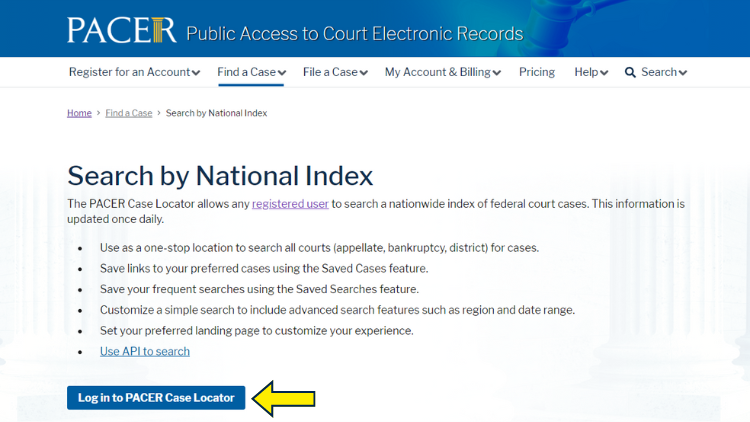
(Image: Public Access to Court Electronic Records3)
Many people who have been indicted will know (or suspect) that legal actions have occurred since a law enforcement investigation usually happens beforehand.
However, it can be helpful to understand the felony indictment process first, and then learn how to know if you have been indicted.
Understanding the felony indictment process will help individuals get a better idea of if they have been or are about to be indicted by a grand jury.
Keep in mind there is no legal requirement that a prosecutor notifies an individual that a grand jury will be deliberating on whether or not to indict them, so most individuals will not know about an indictment until it has been made official.
The process for a federal indictment is similar to the process for filing charges for any crime.
A Crime is Supposedly Committed
All federal indictments will begin with a federal crime being committed. Usually, this will be a crime that was discovered later, rather than an individual being caught committing the crime by law enforcement.
A Crime is Reported & Evidence is Gathered
This will be the first time that the individual that will eventually be incited will have some knowledge of what is going on. Law enforcement will begin to investigate the crime by gathering evidence and speaking with the parties that are supposedly involved.
Although this can be local police, in the case of federal crimes it will likely be a federal agency such as the FBI or IRS that will be in charge of the investigation with the help of local law enforcement.
This is also the stage in the process where legal representation starts to play a role. Individuals who are being questioned about a crime by federal law enforcement should contact a lawyer immediately.
Prosecutor Reviews Evidence
Once sufficient evidence has been gathered, such as witness statements, police reports, or physical evidence, the evidence will be presented to a prosecutor. Normally, a prosecutor will decide if there is enough evidence to charge the individual with a crime.
However, in the case of many federal crimes and due to some state laws, a prosecutor will often be required to call a grand jury to make the decision.
Grand Jury Deliberates
With the evidence in the hands of the prosecutor, a grand jury will be called. In the case of a federal grand jury, this will be 23 individuals. The jury will be presented with evidence from the prosecutor on the facts of the case.
This can include an overview of events, physical evidence, witness testimony, etc. The evidence is presented in a way that is similar to what people expect from a criminal trial. However when all the evidence has been presented the jury will instead decide whether or not to accuse an individual of a crime, rather than to convict.
An Indictment is Filed
Should there be enough evidence to convince a jury that a crime may have been committed, the prosecutor will file an indictment. At this point, filing an indictment is the same as filing charges. The criminal trial will then proceed as it normally would, often with an arrest warrant being issued for the individual. After that, the case can move to having the charges dismissed or dropped, depending on a number of factors.
The process for finding out if you have a federal indictment is the same as a local indictment. Using the above process to search for indictment records at a federal level should reveal all applicable information. Detailed steps to use the PACER is covered further down.
A federal grand jury is a jury that is called by a prosecutor to determine whether or not there is enough evidence to accuse an individual of a federal crime. In the case of a federal grand jury, 23 citizens will be selected to serve on the jury. The selection process is similar to that of a local criminal case with jurors being summoned from the jurisdiction of where the case is being held.
The selection process is also similar with jurors being questioned to determine whether or not they would be fair and impartial jurors. However grand jurors will be questioned by the chief judge of the case, who will be working with the prosecutors. In a normal criminal case, attorneys from both sides will be a part of the jury selection process.
There are plenty of different federal crimes that can lead to an individual being indicted by a federal grand jury. It can be a little bit confusing what constitutes a federal crime compared to a local crime, however, there are several federal crimes that make up the vast majority of indictments.
Immigration Crimes
Crimes involving illegally immigrating into the United States are by far the most common federal crime. This crime is considered federal as it involves crossing international borders, leaving the law enforcement aspect up to a federal agency, rather than a state one. Even if a state or local agency arrests an individual that is in the United States illegally, the individual will likely be handed off to a federal agency such as ICE for immigration-related charges.
Drug Crimes
Drug crimes are another common federal charge (not simply failing a drug test). Oftentimes drug charges involve crimes such as trafficking which involves crossing state lines. Crimes that involve the crossing of state or international borders usually mean a federal agency will be in charge of the case. This also applies to minor drug offenses, so long as the crime involved crossing state lines.
Firearm Crimes
The Bureau of Alcohol, Tobacco, and Firearms (ATF) frequently makes arrests involving firearms such as illegal modifications, illegal firearms sales, and transporting firearms across state lines.
Fraud & White Collar Crimes
Fraud, embezzlement, and certain kinds of theft are also commonly charged by federal agencies. With so much crime occurring over the internet or involving businesses that operate in multiple states or countries, federal agencies are generally tasked with the criminal proceedings for these types of cases.
Stealing from corporations, defrauding investors, and embezzlement are all common federal crimes.
In short, any crime that involves multiple states will likely get the attention of a federal agency which may eventually lead to a federal indictment. Local crimes like theft, homicide, and assault are usually investigated by local law enforcement.
Looking up possible federal indictments is far easier than it has been in the past thanks to the PACER system that is maintained by the U.S. Court System. Since the majority of indictments will be public information the indictment itself can be found by looking at court records.
Detailed steps are outlined above.
Many individuals trying to figure out how to check if you have an indictment may have heard of secret or sealed indictments and will be wondering if they have one of these as well.
Secret indictments are fairly rare but they do happen from time to time. Secret indictments are when a prosecutor chooses not to make an indictment public knowledge. Due to the freedom of information act, this requires extra-legal proceedings in order to prove that indicting someone in secret is a necessary step for one reason or another.
Unfortunately, a secret indictment is exactly that, individuals generally will have no way of knowing if they have a secret indictment or not. It is still worth the effort to perform the above searches for evidence of an indictment.
By far the best plan of action is to contact a criminal defense attorney. An attorney will have a better understanding of the process and be able to advise individuals on what needs to be done next.
The difference between indictments and charges is only slight and quite simple. Charges are filed by a prosecutor when it is clear that a crime has taken place, these charges accuse an individual of a crime based on evidence.
An indictment is filed by a prosecutor after a grand jury makes the decision to accuse someone of a crime. Evidence will be presented to the jury who will deliberate and make the decision whether to accuse someone. Although the prosecutor still files the indictment, the decision is made by the grand jury.
Charges can be dropped after an indictment? Although not a regular occurrence it is far from unheard of for charges to be dropped after an indictment.
Something as simple as new evidence being discovered that absolves the individual of the alleged crime or shines new light on the case makes it less clear that the individual may have committed the crime. In some cases, even mistaken identity can cause changes to be dropped.
Keep in mind that in many cases a prosecutor may drop charges only to file them again later, once more or better evidence has been collected.
There are 3 main things that can happen if a Grand Jury chooses not to indict an individual. The first is that the case is dismissed and no indictment or charges are filed. This means that no criminal proceedings will happen and the individual should have nothing to worry about.
The second is that the prosecutor will return to the same grand jury at a later date, usually in a time frame that is predetermined by local law, and present new evidence. Just because a grand jury did not indict the first time does not mean they can’t change their mind when new evidence comes to light.
Finally, in some cases, a prosecutor may be able to call a new grand jury. However, this is the least common option and requires certain circumstances to be met. A prosecutor can not simply call numerous juries for the same case in the hopes that one chooses to indict.
Getting indicted can be scary and is almost always a serious matter. Contacting a lawyer is the best way to check for an indictment. Besides an attorney, individuals trying to figure out how to check if you have an indictment can also search local and federal court records.
There is no way to know if you have a secret indictment with any amount of certainty. Individuals who believe they have a secret indictment should contact an attorney immediately.
Individuals who have been indicted will be contacted by mail or will have a warrant issued for their arrest. They can also use the search methods outlined above to search for indictments.
Federal indictments occur when an individual is believed to have committed a federal crime. Evidence that a crime was committed will be presented to a grand jury who will make the decision.
1U.S. Department of Justice. (2024). FOIA.gov – Freedom of Information Act: Learn. U.S. Department of Justice. Retrieved June 28, 2024, from <https://www.foia.gov/>
2Administrative Office of the U.S. Courts. (2024). PACER: Public Access to Court Electronic Records. Retrieved June 28, 2024, from <https://pacer.uscourts.gov/>
3Administrative Office of the U.S. Courts. (2024). Search by National Index. Public Access to Court Electronic Records (PACER). Retrieved June 28, 2024, from <https://pacer.uscourts.gov/find-case/search-national-index>
We use cookies to ensure that we give you the best experience on our website. If you continue to use this site we will assume that you are happy with it